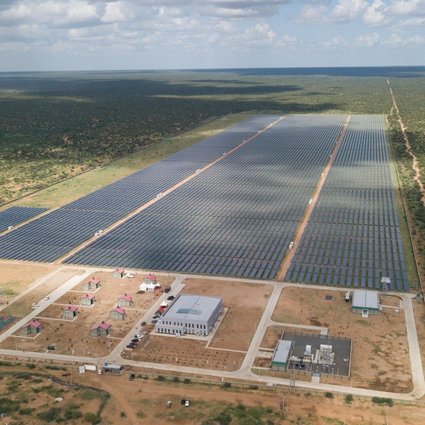
Our Projects are
Transforming African Trade
Quick Contacts
2nd Floor, Fidelity Insurance Centre Waiyaki Way, Westlands

Readers discuss how the Belt and Road Initiative could help African nations better prepare for climate change and China’s commitment to socialism and communism
We have been witnessing some serious climate catastrophes across the world. Unprecedented and massive floods affecting central and northern Europe were followed by record rainfall in Henan, China, and northern India. Climate change is affecting millions of lives across the world.
The consensus in the scientific community is that climate change is anthropogenic – caused primarily by greenhouse gas emissions.
The industrialised world is acting to mitigate greenhouse emissions, although with mixed results. At the same time, it is expected that economic and industrial development in the least developed countries in Asia or Africa could worsen the global climate crisis.
Yet, the least developed countries are disproportionately affected by climate change. For example, the accelerating desertification and drought in the Sahel region boosted cyclone activity on the East African coast and even increased the frequency of locust infestations in the Horn of Africa, affecting the food security of millions of people.
By increasing investment in infrastructure and financial assistance, China’s Belt and Road Initiative is expected to help African nations better prepare to cope with climate change.
Belt and Road Initiative explained
In a chapter in the book Climate Change, Hazards and Adaptation Options, Michael Addaney argues that the “infrastructural development” and “agricultural modernisation”, and the strengthening of “logistical connectivity” and “effective partnerships”, via the Belt and Road Initiative will boost Africa’s capacity to adapt to the global climate crisis.
Although Africa, on a global scale, contributes less to greenhouse gas emissions than the rest of the world, its inevitable economic development as a result of foreign direct investment can potentially aggravate the climate crisis, and consequently, the continent will suffer the most because of it.
The Belt and Road Initiative policy is guided by the Chinese principle of “ecological civilisation” and its infrastructural programme effectively incorporates eco-friendly schemes. This policy has been translated into China-financed mega infrastructure programmes in Ethiopia (the Adama wind farm project), in Ghana (the Bui hydropower project) and in Kenya (the Garissa solar power project).
The policy is embodied in the “five goals” for a “green economy”, as set out in an official Belt and Road Initiative document. It involves embedding resource efficiency and environmental friendliness in policy coordination, facilities connectivity, unimpeded trade, financial integration and economic reciprocity.
Thus, greater investment from China may help Africa gain access to the resources, infrastructure and technology needed to resist some of the consequences of global warming through more sustainable and ecological development.
Roberto Santos, Belas, Portugal
China still socialist despite capitalist moves
Socialism contains a few essential elements: a planned economy and resource allocation by the government, in contrast to capitalism’s free market economy with resource allocation driven by the market.
These two systems are apparently diametrically opposed. However, people see many of Beijing’s policies as tending awkwardly towards capitalism, such as freedom of investment, the stock market and private ownership.
The Chinese call their country a socialist society but may not find it easy to define its socialist character. Some would even suspect that China has become capitalist in practice.
But the Communist Party has never distanced itself from socialist doctrine. Ultimately, China’s leaders want to shape a communist society out of this transient socialist status. To achieve this goal, a wealthy society is a basic criterion and capitalist-like policies are purely a means to boost wealth. Behind the scenes, economic planning and resource allocation are in the firm grip of the government.
Beijing sets gross domestic product targets and identifies the priorities of economic development. These national policies are mainly implemented by the strong executive arm and state-owned enterprises that follow the government’s orders to achieve the annual results needed to meet GDP targets.
The government also directs these enterprises’ investment portfolios and subsidises them in the business areas it prioritises. It directs the private sector’s business development through subsidies and other means, such as in the solar panel and car industries. It enacts regulatory measures to ensure business operations meet its policy objectives.
Steering the state-owned and private enterprises is one of the government’s approaches to resource reallocation. It also provides subsidies directly to households.
In short, China is still a socialist country, though it takes up capitalist means to acquire ample capital to fill the national coffers and pave the way for a communist future.
C.P. Lee, Causeway Bay
Read original article
Disclaimer: The views and opinions expressed in this article are those of the authors and do not necessarily reflect the official policy or position of TradeMark Africa.